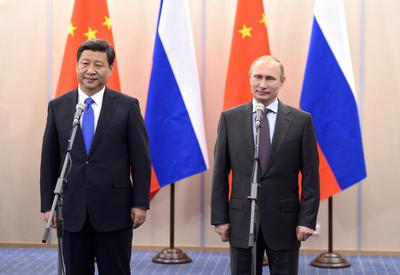instead of directly championing Russia’s cause. In March 2014 Wang Yi, China’s foreign minister, stated that China would not consider taking sides in this conflict. China’s abstention in the Security Council vote validated this statement. Most recently, during his visit to Europe, President Xi stressed that China is in favour of ‘political solutions to the crisis’ that would benefit all parties involved, voicing strong support for international coordination mechanisms.
As the crisis unfolded Chinese media expressed some implicit support for Russia by criticising the West for its hypocrisy in fighting for Ukraine’s sovereignty while having partaken in an anti-democratic revolt against President Yanukovych. A popular article wrote that while the Chinese government wants to maintain a diplomatic equilibrium, Chinese public opinion strongly supports Russia, regarding its actions as legitimate in light of Western containment policies. Neither the official press nor popular nationalistic outlets, however, have directly praised Russia’s invasion of Crimea. The latest tensions in Eastern Ukraine have been widely reported in Chinese press, but largely relying on Western news sources and abstaining from sharp commentary.
China has skilfully balanced its official support for a diplomatic solution to the crisis with projecting some affinity towards Russia’s position. This ambiguity benefits China’s foreign policy in many ways.
First, by staying in the middle China has managed to prevent significant rifts in its relations with the United States and Russia — two important partners. Both parties have used China’s ambivalence to advance their objectives in the crisis. The United States has used China’s abstention to stress Russia’s isolated position, while Russia presented it as a sign of support.
Second, China stands to gain in energy diplomacy as a result of closer ties with Russia. Being forced to look for gas export markets outside of Europe, it is increasingly more likely that Russia will sign the China Gas Deal, which has been stalled for many years. The 30-year deal to supply pipeline gas is timely as Chinese authorities are working to rebalance its national economy and establish reliable energy supplies. Signing the gas deal will also place China in a more confident negotiating position vis-à-vis other energy suppliers.
Third, the Crimea crisis is likely to increase China’s growing assertiveness in the Asia Pacific region. The Ukraine events distracted the United States from its pivot towards Asia, which is already perceived with wariness by Chinese officials and experts, and interpreted as largely reactive to China’s growing influence in the region. The Crimea crisis further highlights the weakness of the United States in managing multiple global objectives along with domestic challenges, giving more leverage to China in managing regional affairs.
Most importantly, the Crimea events taught China that unilateral actions could succeed. This has important implications for its potential confrontation with Japan, and also with Taiwan in the future. The inability of the West to stop Russia’s annexation of Ukraine demonstrates the weakness of the international community. The already vocal public opinion in China is further fuelled by Russia’s defiance of Western pressure. In future crises, the Chinese public will look to Russia as an example of leadership, making it harder for Chinese leaders to uphold a more diplomatic position. As the media attention focused on Ukraine, China has persisted in upholding its stance on contentious issues in the Asia Pacific. It gave stern warnings to the Philippines over disputed shoal, and continued to defend its ‘undisputable sovereignty’ over the Diaoyu/Senkaku islands.
The events in Crimea demonstrated to China that it pays off maintaining neutrality in international conflicts for as long as possible and to treat such crises as strategic lessons. China learned that assertiveness can yield effective results, and the costs of international retribution remain relatively low. How it incorporates these lessons into its foreign policy is something to watch closely in the future.
Maria Repnikova is a post-doctoral fellow at the Asan Institute for Policy Studies and a visiting scholar at the Government Department, Georgetown University. You can follow her on Twitter @MariaRepnikova


good!